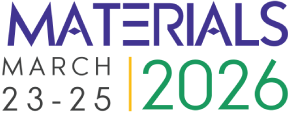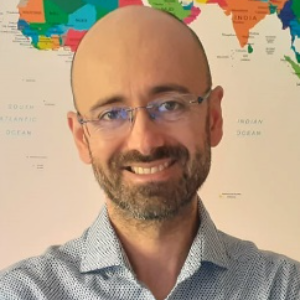Title : Towards effective green hydrogen production by enhancing oxygen electrode kinetics with transition metals Ni Fe Cu alloyed to platinum supported on graphene nanoplatelets
Abstract:
Alkaline water electrolysis is the most mature technology for hydrogen production. If the required electricity comes from renewable energy sources (e.g., solar, wind), green hydrogen will be generated. Improving hydrogen (HER) and oxygen evolution reaction (OER) efficiency is essential to make electrolysis more competitive with dominant fossil fuel-based technologies. That requires developing efficient electrocatalytic materials for fuel and oxygen electrodes. In this study, PtM (M = Ni, Fe, Cu) nanoparticles were supported on graphene nanoplatelets (GNPs) and tested as electrocatalysts for the positive electrode of unitized regenerative fuel cells (URFCs), i.e., both for the oxygen reduction (ORR) and oxygen evolution (OER) reactions. URFCs work in two operation modes: electrolysis mode, converting water to hydrogen and oxygen when there is a surplus of electricity, and fuel cell mode, in which hydrogen and oxygen are consumed when there is a need for extra power. These PtM/GNPs catalysts were synthesized via simultaneous supercritical carbon dioxide (scCO2) deposition technique, where the primary metal (Pt) and secondary metal (Ni, Fe, Cu) were deposited onto GNPs by scCO2 in the same step. This resulted in ca. 20 wt.% Pt loading and M loading in the 1.4 - 3.4 wt.% range. Morphology analysis by TEM revealed the formation of metal nanoparticles of 2–3 nm size uniformly distributed over GNPs, while XPS was used to determine their oxidation states. The produced materials were tested as electrocatalysts for ORR and OER, assessing their potential application in URFCs and rechargeable metal-air batteries. The electrocatalytic activity towards ORR was investigated in 0.1 M KOH by performing a series of linear scan voltammetry experiments at different rotation rates to calculate the number of exchanged electrons, n, and the Tafel slope, b, two key parameters for electrocatalysts’ evaluation. PtFe/GNPs exhibited favorable ORR kinetics in terms of the highest diffusion-limited current density, low Tafel slope, and high number of exchanged electrons (n = 3.66), which might be attributed to its high double-layer capacitance and, thus, high electrochemically active surface area. Furthermore, this material performance was comparable to that of commercial Pt/C electrocatalyst containing double the amount of Pt. PtFe/GNPs also showed the best performance toward OER as evidenced by the high current density, the lowest overpotential to reach a current density of 10 mA cm-2, and the lowest Tafel slope. The results show great promise of the synthesized PtFe/GNPs as bifunctional catalysts for OER/ORR in URFCs.
What will audience learn from your presentation
- This presentation will present the fundamentals of green hydrogen production by alkaline water electrolysis.
- Then, a particular study on the development of bifunctional catalysts for OER/ORR will show the possibility of incorporating such catalysts in the oxygen electrode of unitized regenerative fuel cells for enhancing the efficiency of green hydrogen production (electrolysis mode) and simultaneously boosting the oxygen reduction reaction kinetics (fuel cell mode).



